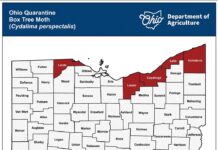SALEM, Ohio — On a Thursday afternoon in April, as a deadline for the Ohio budget bill approached, emails flew back and forth between a member of the Ohio Chamber of Commerce and state House Rep. James Hoops’ office.
In these emails, Zack Frymier, the chamber’s director of energy and environmental policy, requested a meeting with Hoops to discuss adding language that targeted the Lake Erie Bill of Rights. The referendum, known as LEBOR, passed in Toledo on Feb. 26 and gave its citizens the right to sue polluters on behalf of the lake.
Several months later, on July 18, the language Frymier requested — which prevents citizens from participating in court on the lake’s behalf and declares that nature and ecosystems do not have standing in court — was signed into law as part of the Ohio budget bill.
The emails came to light after freedom of information requests were filed by community rights organizers. They were provided to the New Food Economy and The Intercept publications and posted online, Aug. 29.
That last-minute change does not make LEBOR go away, however, it does mean Toledo citizens cannot file in court anymore. It also throws the success of other similar ballot initiatives into doubt, according to Peggy Hall, Ohio State associate professor and field specialist in agriculture and resource law.
The pending lawsuit, which was filed before the new state budget was signed, is unaffected, Hall said.
Lawsuit
The day after LEBOR passed by a 60% margin, with an 8.9% voter turnout, Drewes Farms Partnerships filed a lawsuit in U.S. District Court of Northern Ohio, against the City of Toledo. The suit said, among other things, that the bill was unconstitutional and put the farm at risk.
The Ohio Farm Bureau Federation publicly supported Drewes Farms Partnership in the lawsuit. Both parties in the suit have filed motions for judgment, which are pending.
Because the budget bill passed after the lawsuit was filed, and because the lawsuit is about whether or not LEBOR is constitutional, the language in the budget bill cannot affect the lawsuit, according to Hall.
The budget bill also does not make LEBOR disappear.
It could, however, prevent Toledo citizens from filing lawsuits against anyone who harms the lake, Hall said. It could also discourage other community rights groups across the state from attempting to create and pass similar bills.
Hall noted that community rights organizers could still challenge the statute in the future, if they argue that it goes against their constitutional rights to self-governance.
Crystal Jankowski, an organizer for Toledoans for Safe Water, said the added language came as a shock.
While she was not surprised to have opposition to LEBOR, she did not expect legislation targeting all other similar efforts across the state.
“It’s just not OK. When the people vote, the people vote. That’s their voice … it’s frustrating,” she said.
Emails
After the language was added to the budget bill, Bill Lyons, a member of the Ohio Community Rights Network, filed a request for information to find out who had introduced the language.
The emails revealing the chamber’s involvement were unexpected, according to community rights groups.
In the emails, Frymier requested a meeting with Hoops, chair of the Ohio House Finance subcommittee on agriculture, development and natural resources, to discuss language connected to LEBOR.
Frymier acknowledged it would have to be submitted after the impending deadline, which was the day after he sent the email. Hoops’ office responded quickly, suggesting a meeting that same afternoon, which Frymier agreed to.
A couple of weeks later, Hoops’ office forwarded a draft of the requested language to Frymier, asking if the wording made sense.
Frymier replied that the amendment looked good, but he had one more addition to request.
“The statement that nature and ecosystems do not have standing currently contradicts what the Lake Erie Bill of Rights, which is current law in Toledo, states. Language in this amendment stating that they do not have standing is essential to what we’re trying to accomplish,” he wrote.
Fallout
The final version of the bill added that “nature or any ecosystem does not have standing to participate in or bring an action in any court of common pleas,” as Frymier requested.
“This goes much deeper than this single issue; this is about how laws are passed and enforced,” said Tish O’Dell, community organizer for the Community Environmental Legal Defense Fund.
Neither the Ohio Chamber of Commerce, nor Hoops’ office, responded to repeated requests for comment, prior to press time.
Previous opposition
This is not the first time LEBOR has faced opposition.
The Lucas County Board of Elections chose not to add LEBOR to the November 2018 ballot, although the bill later made it to a special election ballot in February 2019.
After LEBOR was not placed on the November ballot, in August 2018, several LEBOR activists sought legal action to force the Lucas County Board of Elections to add LEBOR to the ballot.
Organizations, including the Ohio Chamber of Commerce, Affiliated Construction Trades Ohio Foundation and The Ohio Oil and Gas Association filed a joint brief in support of the board of elections.
The Ohio Farm Bureau Federation and multiple other farmers’ organizations also filed a separate brief in support of the board of elections.
In an interview with Great Lakes Now, published before LEBOR passed, Frymier said LEBOR would strip businesses and corporations of the right to argue that LEBOR is unconstitutional or illegal in court. He also, however, said the chamber was not actively campaigning against LEBOR and instead was serving as an information and support source for Ohio businesses.
Jack Irvin, senior director of Ohio Farm Bureau’s state and national policy, told Farm and Dairy that the issues addressed in the budget bill language were a topic of discussion for farm bureau and many other organizations.
“We were definitely supportive of that language,” he said. “It’s no secret that we have a lot of concerns with some of the bill of rights initiatives.”
He added that farm bureau supports the efforts the chamber moved forward.
“Obviously, that was a legislative decision,” Irvin said, adding that those decisions are “outside of our purview.”
Still, he said farm bureau does not believe that the bill of rights initiatives are the best way to address water quality issues. He said farm bureau would be supportive of any efforts to examine this approach.
Other initiatives
O’Dell noted organizers in Williams County tried to add an initiative to their ballot this summer to protect the Michindoh Aquifer, a major drinking water source.
Despite organizers gathering more than the required amount of valid signatures, the board of elections rejected their initiative as unconstitutional, according to O’Dell.
“Here we’ve got the chamber of commerce, who wants a law passed affecting their interests,” O’Dell said. “And yet the people who are following all the rules in the Ohio constitution … they can’t even vote on it.”
According to Hall, however, the initiative was rejected because the initiative proposed changing the county government to a charter government and did not correctly follow the statutes required for that proposal.
Hall said while LEBOR is focused on Lake Erie, the Williams County efforts were more focused on community rights and how a county can govern itself.










